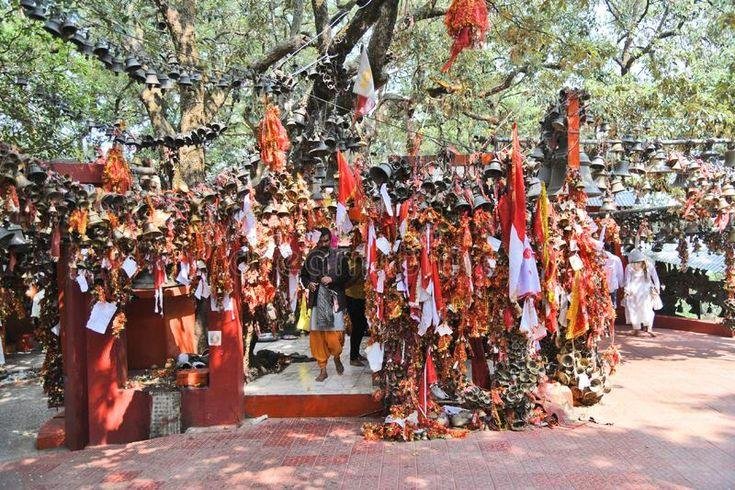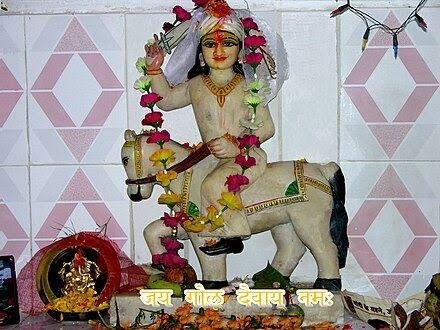Golu Devta: The Deity of Justice
Golu Devta, also known as the God of Justice, is a revered deity in the Kumaon region of Uttarakhand, India. He is widely worshipped across the state, particularly in the Almora, Champawat, and Nainital districts. Known for his fairness and promptness in dispensing justice, Golu Devta holds a unique place in the hearts of the people, who revere him as a divine judge.

Legend and Mythology
Golu Devta is believed to be an incarnation of Lord Shiva. According to popular folklore, he was the youngest son of Katyuri King Jhal Rai, and his mother was Kalinka, a princess of the Sun dynasty. Golu Devta's life was marked by valor, justice, and a deep sense of duty, which earned him the divine status of a just and fair deity.
One of the most famous legends associated with Golu Devta is his battle against injustice. During his time, corrupt rulers and landlords were known to exploit the common people. Golu Devta, with his deep sense of justice, took it upon himself to protect the oppressed. In one notable story, he challenged a tyrannical local king who imposed heavy taxes and harsh punishments on those who could not pay. Despite being outnumbered, Golu Devta fought valiantly in the battle against the king's forces but was ultimately killed. However, his spirit was believed to have ascended to the divine realm, where he continues to hear the pleas of the oppressed and ensures that justice is served.
After his death, Golu Devta was deified, and his followers began worshipping him as the God of Justice. His legacy as a protector of the weak and a fair ruler earned him widespread reverence, and he became an enduring symbol of justice in the Kumaon region.
Temples and Worship
There are numerous temples dedicated to Golu Devta across Uttarakhand, with the most famous ones located in Chitai (Almora) and Ghorakhal (Nainital). The Chitai Golu Devta Temple, located about 9 kilometers from Almora, is the most prominent among these. It is renowned for the thousands of bells that adorn the temple, offered by devotees as a token of gratitude after their wishes are fulfilled.
Devotees of Golu Devta often write letters to the deity, detailing their grievances and requests for justice. These letters, along with a bell, are tied to the temple premises. It is believed that Golu Devta answers these prayers swiftly, providing relief to those who seek his help.
Rituals and Offerings

Worshipping Golu Devta is a simple yet deeply spiritual process. Devotees offer milk, ghee, curd, white sweets, and white cloth as these are considered sacred to him. The most distinctive aspect of the offerings, however, is the bells. Devotees bring bells of varying sizes to the temple as a sign of their faith. After their wishes are granted, they return to the temple to offer a bell in gratitude.
On special occasions, like Navratri, the temple witnesses a surge in the number of devotees who come to seek blessings. During these times, the temple is beautifully decorated, and special prayers and rituals are conducted.
The Tradition of Bell Offerings
A unique aspect of Golu Devta's worship is the offering of bells. This tradition is deeply rooted in the belief that Golu Devta hears and grants the wishes of his devotees, especially those related to matters of justice. When a devotee’s wish is fulfilled, they return to the temple to offer a bell as a token of gratitude. The thousands of bells hanging in the temples are a testament to the countless prayers answered by the deity. The ringing of these bells is believed to carry the voice of the devotee directly to Golu Devta, ensuring that their plea for justice is heard.
Significance in Uttarakhand Culture
Golu Devta is not just a deity but a symbol of justice and righteousness in Uttarakhand. His temples are often the first place people go when they feel wronged or seek divine intervention in legal matters. The faith in Golu Devta transcends religion and caste, uniting people in their belief in his fairness and benevolence.
Golu Devta's influence is so profound that his name is often invoked in the local justice system. The belief is that if someone swears by Golu Devta, they are bound to speak the truth, as lying under his name is considered a grave sin.
Conclusion
The story of Golu Devta is not just a tale of divine justice but also a reflection of the deep-rooted belief in fairness and righteousness in the culture of Uttarakhand. Golu Devta’s legacy continues to thrive, with countless devotees turning to him in their times of need, confident that the God of Justice will hear their prayers and ensure that justice prevails. His temples, adorned with countless bells, stand as a testament to the unwavering faith of his devotees. Whether it is a matter of personal grievance or a larger societal issue, the people believe that Golu Devta will ensure justice prevails, making him one of the most beloved gods in the region.
